
"Breaking Up Is Hard to Do" is a song recorded by Neil Sedaka, and co-written by Sedaka and Howard Greenfield. Sedaka recorded this song twice, in 1962 and 1975, in two significantly different arrangements, and it is considered to be his signature song. Between 1970 and 1975, it was a top-40 hit three separate times for three separate artists: Lenny Welch, The Partridge Family and Sedaka's second version.
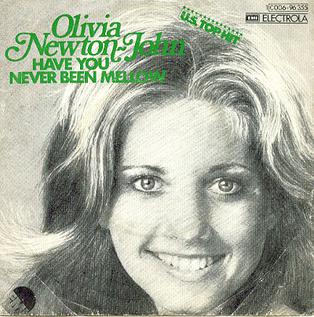
"Have You Never Been Mellow" is a popular song written by John Farrar and recorded by Olivia Newton-John as the title track for her album of the same name.

"Like to Get to Know You" is a 1968 song from Spanky and Our Gang. Written by Stuart Scharf, the song debuted at number 71 on the Billboard Hot 100 on April 20, 1968, and peaked at #17 on June 8, 1968. It became a minor hit on the Billboard Easy Listening chart at the same time, eventually peaking at #24 the same week it peaked on the Hot 100. In Canada, the song reached #5 on the RPM Magazine charts. On the album of the same name, the song is broken into two parts: the full vocal, and a coda that echoes the chorus and conversation from the song.

"Raining in My Heart" is a song recorded by Buddy Holly on October 21, 1958 with the orchestral backing by Dick Jacobs. The music and lyrics are written by the songwriting team of Felice Bryant and Boudleaux Bryant. It was released as a single on Coral Records in 1959, peaking at #88 on the Billboard charts as the B-side of "It Doesn't Matter Anymore". This recording was included on Buddy Holly's first "greatest hits" compilation album titled The Buddy Holly Story that was released in March 1959.
"Baby Face" is a popular song. The music was written by Harry Akst, the lyrics by Benny Davis. The song was published in 1926. That same year, Jan Garber had a number one hit with the song.
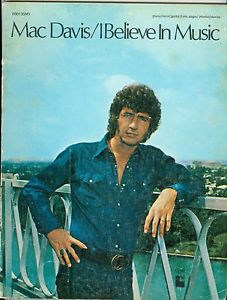
"I Believe in Music" is a 1970 song written and recorded by Mac Davis and later included on his second album I Believe in Music. Gallery covered it in 1972 as the second of three singles on their Nice to Be with You album as the follow-up release to their title track.
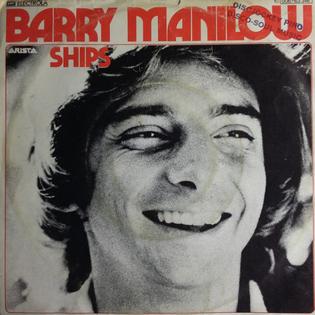
"Ships" is a song written and originally performed by British musician Ian Hunter. The song was first released on Hunter's fourth solo album, You're Never Alone with a Schizophrenic in 1979. The song is said to be about Hunter's relationship with his father.

"Almost Over You" is a 1983 single by Sheena Easton from her Best Kept Secret LP. The single reached number 25 on the Billboard Hot 100, while its Adult Contemporary peak was number 4. In Canada, the song reached number 35 and number one on the Adult Contemporary chart.

"One Hundred Ways" is a 1981 single released from Quincy Jones' album The Dude on A&M Records. The song features James Ingram on vocals. The song reached number 14 on the U.S. Billboard Hot 100 in 1981. It was a bigger Adult Contemporary hit, reaching number five in the U.S. and number six in Canada. "One Hundred Ways" received the 1982 Grammy Award for Best R&B Vocal Performance.
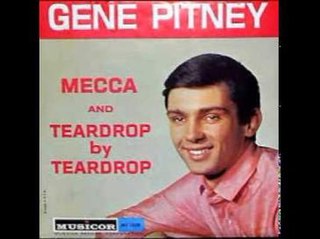
"Mecca" is a 1963 song which was a hit for Gene Pitney. It was the first release and greatest hit from his LP, Gene Pitney Sings Just for You.

"Hummingbird" is a song by American soft rock duo Seals and Crofts, released as a single in 1973. It was the second single from their fourth studio album, Summer Breeze, the follow-up to the LP's title track.

"Missing You" is a song written and recorded by singer/songwriter Dan Fogelberg in 1982. Previously unreleased, it was included on his Greatest Hits LP and released simultaneously.
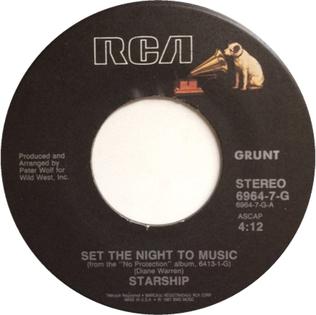
"Set the Night to Music" is a song written by Diane Warren and recorded by Starship on their LP, No Protection (1987). It became a major hit for Roberta Flack in 1991. Starship's original version became a Top 10 hit on the U.S. Billboard Adult Contemporary chart, reaching number nine in the spring of 1988, and also charted minorly in Canada.

"The Straight Life" is a 1968 song written and originally recorded by Sonny Curtis. It was made into a Top 40 hit by Bobby Goldsboro later that year.

"I Can't Live a Dream" is a 1976 single by The Osmonds as the first track on their Brainstorm LP..

"I Live for Your Love" is a 1987 song by Natalie Cole. It was the second of four charting singles from her Everlasting LP, and was also the second greatest hit from the album.

"Sweetheart" is a 1981 song by Franke and the Knockouts. It was their debut single and greatest hit, reaching the U.S. Top 10 during the spring of that year. It spent 19 weeks on the charts and is ranked as the 50th biggest hit of 1981.

"I Know a Heartache When I See One" is a song by Jennifer Warnes from her third LP, Shot Through the Heart. It was the first of three charting singles from the album.

"Flim Flam Man" is a song written by Laura Nyro for the 1967 film The Flim-Flam Man. It was first recorded and released by Nyro in February 1967 on her debut album More Than a New Discovery.

"Hooked on You" is a song written and composed by David Gates, and originally recorded by the pop-rock group Bread, of which Gates was the leader and primary music producer. It was the second single released from Bread's 1976 album Lost Without Your Love, and became their final charting hit.



















